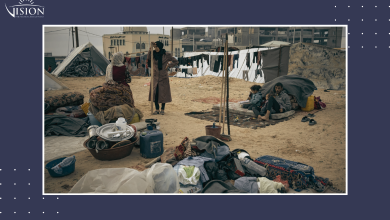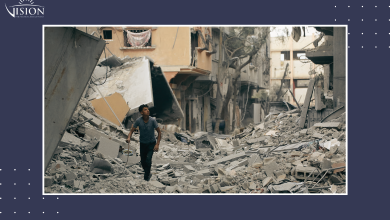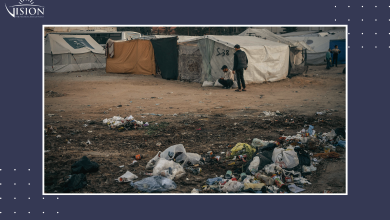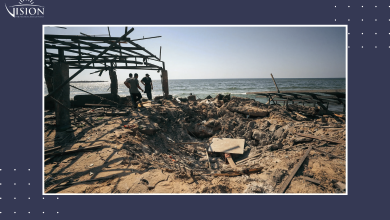Vision Center and Al Sharq present their recent publication, titled, “Studies on the Transformations of Palestinian Society between Oslo and the Time of Genocide”
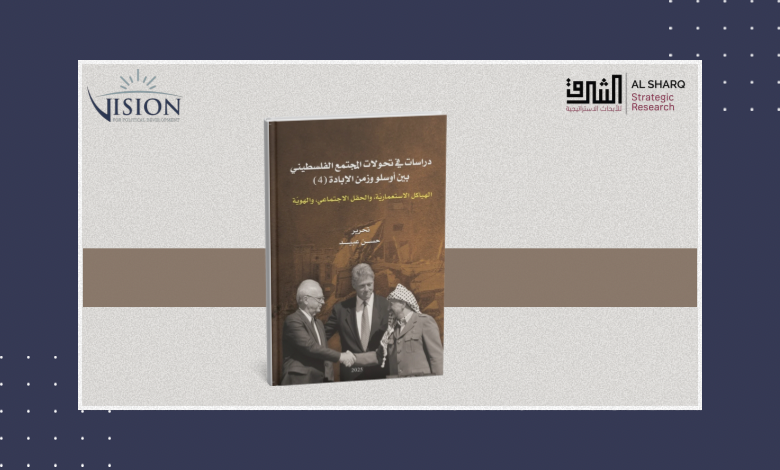
“Studies on the Transformations of Palestinian Society Between Oslo and the Time of Genocide: Colonial Structures, the Social Field, and Identity” is a recently published book by Al Sharq Strategic Research and Vision Center for Political Development, authored by a group of researchers and edited by Hassan Obaid.
The 426-page volume includes contributions from: Hassan Obaid, Ibrahim Rabaia, Manar Younis, Mansour Al-Nasasra, Ali Habiballah, Asad Ghanem, Adib Ziadeh, Walid Salem, Yafa el-Makdisi, Dareen Al-Sayyad, Fairouz Salama, Samoud Bawakna, Hidaya Muhammad Al-Tatar, Karim Qurt, Saher Ghazawi, and Raghad Azzam.
In the first chapter titled, “Isolation: Hegemony and Colonial Reengineering,” Ibrahim Rabaia explores the concept of isolation in the context of Zionist colonialism. The study begins by situating the concept within Zionist security and political doctrines, moves on to examine its embodiment in the lived practices in the occupied territories, its evolutionary stages after 1967, and its transformations following the establishment of the Palestinian Authority.
Manar Younis’s study, “The Colonial System in the West Bank and Its Impact on the Identity of Palestinian Labor Inside the 1948 Occupied Territories,” examines the transformations in the identity of Palestinian workers following the signing of the Oslo Accords (1993–1995). The research focuses particularly on the period beginning in 2005 and onward, when Israel began imposing an exhausting regime of borders and checkpoints, along with a complex permit system based on a vague and loosely defined security criteria, open to interpretation, designed to facilitate the occupation in controlling the movement of Palestinian workers into its territory.
Mansour Nasasra’s chapter on, “Occupied Jerusalem After 30 Years of the Oslo Accords: Policies of Isolation, Political and Economic Exclusion, and Displacement,” addresses the situation of occupied Jerusalem from the signing of the Oslo Accords up to the post–May 2021 uprising period.
In, “Israel’s Policies in Politicizing and Institutionalizing Kinship Identity Within Local Authorities in the Arab Society Inside the 1948 Occupied Territories,” Ali Habiballah explores how Israeli occupation politicized kinship-based identities and traditional structures within local authorities, and how this politicization was institutionalized in the Arab society within the 1948 occupied areas. The study also examines the impact of these policies on the Palestinian national movement and its discourse.
Meanwhile, Asad Ghanem’s paper, “Palestinians in Israel: The Relationship Between Social Environments and Hope in Political Struggle,” assumes that there is a close relationship between the patterns and intensity of political activity and the levels of support, endorsement, or social solidarity received by political actors. These actors manage or devise forms of action and political socialization that, from their perspective, contribute to achieving the goals of the group (or sector) they aim to serve.
Adeeb Ziyadeh’s paper, titled “Post-Oslo Transformations in Resistance Practices within the Palestinian Diaspora,” examines the condition of the Palestinian diaspora and the institutional frameworks that underpin its activism. It highlights the defining characteristics, challenges, and opportunities of this activism, as well as the proposed mechanisms for its revitalization, contrasted with the state of paralysis imposed by the complexity of national issues. The key themes discussed include: the stages of Palestinian mobilization in the diaspora, the nature of refugees’ engagement in activism, the challenges facing the movement, and the potential opportunities that lie before it.
In Walid Salem’s paper, “Transformations in Collective Palestinian Struggle: A Case Study of the May 2021 and April–May 2022 Uprisings,” the author argues that these two uprisings marked a turning point in what has been called ‘the Palestinian popular resistance against occupation and settler colonialism in Palestine.’ They transcended the binary framework of thinking between violence and nonviolence, and between armed and peaceful struggle.
Yafa el-Makdisi, in her paper “The Sociology of Familial (‘Tribal’) Practices and their Transformations within the Context of Palestinian Resistance,” seeks to discuss the transformations in the role of the Palestinian family in supporting and managing the daily lives of its members, as well as its relations with other families or clans throughout significant historical junctures; namely, the Nakba, the period of military rule, and the establishment of the Palestinian Authority.
Dareen al-Sayyad’s study, titled “The Role of Education in Shaping National Identity Awareness among Learners: The Modified Palestinian Curriculum as a Model,” focuses on the current generation of students enrolled within the education system. The study surveys their opinions and explores their perspectives, tracing how they understand the national concepts that contribute to the formation of their subjectivities, social and political consciousness, and perceptions of the Palestinian question.
A set of contributions dedicated to the post–October 7, 2023 period, is divided into two sections. The first section examines the refugee camps of northern West Bank as centers of resistance targeted by Operation Iron Wall, which aimed to erase their identity and transform them into urban spaces stripped of meaning. The second section includes studies highlighting Palestinian society in Gaza during the genocide, where the most extreme forms of killing and displacement are manifested. These papers reveal the profound contestations between colonial erasure policies and the will to endure and persist expressed through community resilience.
The publication of this book comes as part of the fourth series of releases and conferences that aim to understand Palestinian social transformations in the post-Oslo era, contributing to the formation of a renewed vision that restores the centrality of the Palestinian cause and seeks to overcome the impasse it has faced for more than four decades.
The first edition of the book is available from:
Vision Center for Political Development – Istanbul.


